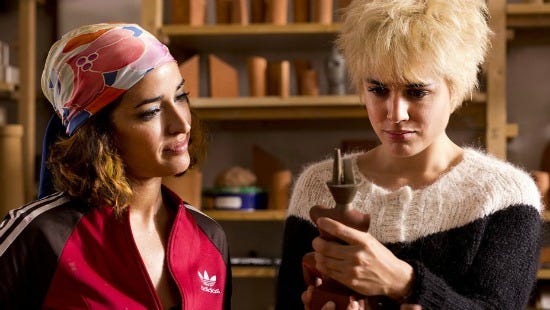Julieta

Oh, Pedro Almodóvar and his women.
Is there another male filmmaker, American or foreign, whose career has been so dedicated to exploring complex, nuanced female characters? The Spanish master’s oeuvre is filled with stories of mothers and daughters, wives and lovers, sisters and mistresses. Men are nearly always in the background of his films.
“Julieta” is a minor work in Almodóvar’s filmography, but still a worthy one. It explores how a woman’s history of loss changes her from a dynamic young independent spirit into a middle-aged person bound by regret — but still filled with a resolve to seek out love wherever she can find it.
Emma Suárez and Adriana Ugarte play Julieta at older and younger stages, respectively. It’s a testament to their skills that we feel the continuity of a single life despite any lack of resemblance in face or voice.
As the story opens, Julieta is preparing to move from Madrid to Portugal with her boyfriend, Lorenzo (Dario Grandinetti). It seems an ideal situation for the longtime widow, a pleasant ramp down to fulfilling golden years.
But then she runs into a friend of her daughter, Antia, whom she has not heard from in years. She used to receive blank cards on her birthdays, but now not even that. The friend tells her that her child is living in Switzerland with three children of her own — grandkids she never even knew existed.
Abruptly, Julieta cancels the move with Lorenzo, knowing it will doom the relationship. She even moves back into the old apartment she had while raising Antia — clinging to the desperate hope that her daughter will come home to her again.
Ugarte takes over the role as the story shifts to an extended flashback. We meet Antia’s father, Xoan (Daniel Grao), whom Julieta met on a train. A tragedy brings them closer together, and they begin an affair even though Xoan is still married, to a woman in a coma. Sadness clings to Xoan like dew to a flower, but she can’t resist his presence.
Things go on from there with typical Almodóvar story twists involving affairs, tragic accidents and misunderstandings that grow into yawning chasms of emotional separation. As usual, the filmmaker also penned the script.
“Julieta” is a rather low-key movie, without the usual epic tides of emotion we’re used to from the Spanish filmmaker. But that’s by design, I think. He’s exploring how someone reacts when the people most dear to them are suddenly ripped away — by circumstance, and by another’s seemingly cruel choice. It’s a quiet tempest.

